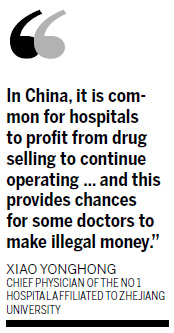4_China
Hospital scam sparks crackdown
By Cang Wei and Shan Juan (China Daily)
Updated: 2010-11-18 07:49
 |
Large Medium Small |

Beijing - China's Ministry of Health vowed to crack down on bribery in hospitals after news of the corruption scandal involving dozens of doctors in East China broke early this week.
Those found to have accepted bribes would face suspension from work or even cancellation of their medical licenses in serious cases, the People's Daily reported on Wednesday, quoting an unnamed official with the ministry.
In China, some pharmaceutical and medical equipment companies pay kickbacks to doctors and hospital staff to boost product sales, and the problem has run rampant in parts of the country, undermining patients' interests, the report said.
An online post on Monday revealed that dozens of doctors at several hospitals in Hangzhou, Zhejiang province, including the Sir Run Run Shaw Hospital affiliated to Zhejiang University, were taking bribes from a pharmaceutical company.
They were said to have taken cash, oil cards, shopping cards and digital cameras from the Hangzhou Tairui Medical Device Co Ltd, in return for buying the company's products.
The online writer, named CCTV9090, said he learned of this from a flash disk he happened to pick up on a bus.
Meanwhile, 10 pictures were also published, in which the names of doctors and the kickbacks they took can be seen clearly.
He Chao, director of the Sir Run Run Shaw Hospital, denied his doctors involved in the scandal had taken cash, but he admitted that some doctors had accepted cards and digital cameras, but "only to use them for medical purposes".
As the public reacted angrily toward the doctors listed in the post, insiders said it was an institutional problem.
"In China, it is common for hospitals to profit from drug selling to continue operating, since they are in charge of the pharmaceutical departments and this provides chances for some doctors to make illegal money," said Xiao Yonghong, chief physician of the No 1 Hospital affiliated to Zhejiang University.
"Meanwhile, because the drug market and the medical device market are intensely competitive, some companies use bribes to promote sales," he said.
The Ministry of Health has asked provincial health authorities to establish a system to register cases of bribery in the medical industry and make them known to the public.
Provincial health authorities, hospitals and medical organizations should not buy products from enterprises that have been involved in bribery cases within the past two years, the report said.
With the ongoing public hospital reforms, the Ministry of Health has tried to root out such problems. The central and local governments have increased investments in public hospitals to prevent them from relying on medicine sales.
The profits made in some hospitals have been eliminated since the introduction of public bidding for medicine.
For public hospitals chosen for the reform trials, the government have invested heavily to cover all operational costs, including the purchase of drugs and medical devices.
"There used to be opportunities to get kickbacks, but now there is no access," said Wang Xiaodong, a surgeon in Zichang County People's Hospital, one of the hospitals in Shaanxi province chosen for reform trials.
"However, it takes time to spread this method to hospitals nationwide."
China Daily